Northanger Abbey Page #8
Northanger Abbey was the first of Jane Austen's novels to be completed for publication, in 1803. However, it was not published until after her death in 1817, along with another novel of hers, Persuasion.
“But you should not persuade me that I think so very much about Mr. Tilney, for perhaps I may never see him again.” “Not see him again! My dearest creature, do not talk of it. I am sure you would be miserable if you thought so!” “No, indeed, I should not. I do not pretend to say that I was not very much pleased with him; but while I have Udolpho to read, I feel as if nobody could make me miserable. Oh! The dreadful black veil! My dear Isabella, I am sure there must be Laurentina's skeleton behind it.” “It is so odd to me, that you should never have read Udolpho before; but I suppose Mrs. Morland objects to novels.” “No, she does not. She very often reads Sir Charles Grandison herself; but new books do not fall in our way.” “Sir Charles Grandison! That is an amazing horrid book, is it not? I remember Miss Andrews could not get through the first volume.” “It is not like Udolpho at all; but yet I think it is very entertaining.” “Do you indeed! You surprise me; I thought it had not been readable. But, my dearest Catherine, have you settled what to wear on your head tonight? I am determined at all events to be dressed exactly like you. The men take notice of that sometimes, you know.” “But it does not signify if they do,” said Catherine, very innocently. “Signify! Oh, heavens! I make it a rule never to mind what they say. They are very often amazingly impertinent if you do not treat them with spirit, and make them keep their distance.” “Are they? Well, I never observed that. They always behave very well to me.” “Oh! They give themselves such airs. They are the most conceited creatures in the world, and think themselves of so much importance! By the by, though I have thought of it a hundred times, I have always forgot to ask you what is your favourite complexion in a man. Do you like them best dark or fair?” “I hardly know. I never much thought about it. Something between both, I think. Brown--not fair, and--and not very dark.” “Very well, Catherine. That is exactly he. I have not forgot your description of Mr. Tilney--'a brown skin, with dark eyes, and rather dark hair.' Well, my taste is different. I prefer light eyes, and as to complexion--do you know--I like a sallow better than any other. You must not betray me, if you should ever meet with one of your acquaintance answering that description.” “Betray you! What do you mean?” “Nay, do not distress me. I believe I have said too much. Let us drop the subject.” Catherine, in some amazement, complied, and after remaining a few moments silent, was on the point of reverting to what interested her at that time rather more than anything else in the world, Laurentina's skeleton, when her friend prevented her, by saying, “For heaven's sake! Let us move away from this end of the room. Do you know, there are two odious young men who have been staring at me this half hour. They really put me quite out of countenance. Let us go and look at the arrivals. They will hardly follow us there.” Away they walked to the book; and while Isabella examined the names, it was Catherine's employment to watch the proceedings of these alarming young men. “They are not coming this way, are they? I hope they are not so impertinent as to follow us. Pray let me know if they are coming. I am determined I will not look up.” In a few moments Catherine, with unaffected pleasure, assured her that she need not be longer uneasy, as the gentlemen had just left the pump-room. “And which way are they gone?” said Isabella, turning hastily round. “One was a very good-looking young man.” “They went towards the church-yard.” “Well, I am amazingly glad I have got rid of them! And now, what say you to going to Edgar's Buildings with me, and looking at my new hat? You said you should like to see it.” Catherine readily agreed. “Only,” she added, “perhaps we may overtake the two young men.” “Oh! Never mind that. If we make haste, we shall pass by them presently, and I am dying to show you my hat.” “But if we only wait a few minutes, there will be no danger of our seeing them at all.” “I shall not pay them any such compliment, I assure you. I have no notion of treating men with such respect. That is the way to spoil them.” Catherine had nothing to oppose against such reasoning; and therefore, to show the independence of Miss Thorpe, and her resolution of humbling the sex, they set off immediately as fast as they could walk, in pursuit of the two young men. CHAPTER 7 Half a minute conducted them through the pump-yard to the archway, opposite Union Passage; but here they were stopped. Everybody acquainted with Bath may remember the difficulties of crossing Cheap Street at this point; it is indeed a street of so impertinent a nature, so unfortunately connected with the great London and Oxford roads, and the principal inn of the city, that a day never passes in which parties of ladies, however important their business, whether in quest of pastry, millinery, or even (as in the present case) of young men, are not detained on one side or other by carriages, horsemen, or carts. This evil had been felt and lamented, at least three times a day, by Isabella since her residence in Bath; and she was now fated to feel and lament it once more, for at the very moment of coming opposite to Union Passage, and within view of the two gentlemen who were proceeding through the crowds, and threading the gutters of that interesting alley, they were prevented crossing by the approach of a gig, driven along on bad pavement by a most knowing-looking coachman with all the vehemence that could most fitly endanger the lives of himself, his companion, and his horse. “Oh, these odious gigs!” said Isabella, looking up. “How I detest them.” But this detestation, though so just, was of short duration, for she looked again and exclaimed, “Delightful! Mr. Morland and my brother!” “Good heaven! 'Tis James!” was uttered at the same moment by Catherine; and, on catching the young men's eyes, the horse was immediately checked with a violence which almost threw him on his haunches, and the servant having now scampered up, the gentlemen jumped out, and the equipage was delivered to his care. Catherine, by whom this meeting was wholly unexpected, received her brother with the liveliest pleasure; and he, being of a very amiable disposition, and sincerely attached to her, gave every proof on his side of equal satisfaction, which he could have leisure to do, while the bright eyes of Miss Thorpe were incessantly challenging his notice; and to her his devoirs were speedily paid, with a mixture of joy and embarrassment which might have informed Catherine, had she been more expert in the development of other people's feelings, and less simply engrossed by her own, that her brother thought her friend quite as pretty as she could do herself. John Thorpe, who in the meantime had been giving orders about the horses, soon joined them, and from him she directly received the amends which were her due; for while he slightly and carelessly touched the hand of Isabella, on her he bestowed a whole scrape and half a short bow. He was a stout young man of middling height, who, with a plain face and ungraceful form, seemed fearful of being too handsome unless he wore the dress of a groom, and too much like a gentleman unless he were easy where he ought to be civil, and impudent where he might be allowed to be easy. He took out his watch: “How long do you think we have been running it from Tetbury, Miss Morland?”
Translation
Translate and read this book in other languages:
Select another language:
- - Select -
- 简体中文 (Chinese - Simplified)
- 繁體中文 (Chinese - Traditional)
- Español (Spanish)
- Esperanto (Esperanto)
- 日本語 (Japanese)
- Português (Portuguese)
- Deutsch (German)
- العربية (Arabic)
- Français (French)
- Русский (Russian)
- ಕನ್ನಡ (Kannada)
- 한국어 (Korean)
- עברית (Hebrew)
- Gaeilge (Irish)
- Українська (Ukrainian)
- اردو (Urdu)
- Magyar (Hungarian)
- मानक हिन्दी (Hindi)
- Indonesia (Indonesian)
- Italiano (Italian)
- தமிழ் (Tamil)
- Türkçe (Turkish)
- తెలుగు (Telugu)
- ภาษาไทย (Thai)
- Tiếng Việt (Vietnamese)
- Čeština (Czech)
- Polski (Polish)
- Bahasa Indonesia (Indonesian)
- Românește (Romanian)
- Nederlands (Dutch)
- Ελληνικά (Greek)
- Latinum (Latin)
- Svenska (Swedish)
- Dansk (Danish)
- Suomi (Finnish)
- فارسی (Persian)
- ייִדיש (Yiddish)
- հայերեն (Armenian)
- Norsk (Norwegian)
- English (English)
Citation
Use the citation below to add this book to your bibliography:
Style:MLAChicagoAPA
"Northanger Abbey Books." Literature.com. STANDS4 LLC, 2025. Web. 23 Feb. 2025. <https://www.literature.com/book/northanger_abbey_45>.








Discuss this Northanger Abbey book with the community:
Report Comment
We're doing our best to make sure our content is useful, accurate and safe.
If by any chance you spot an inappropriate comment while navigating through our website please use this form to let us know, and we'll take care of it shortly.
Attachment
You need to be logged in to favorite.
Log In